Syria’s Assad in UAE to mark ongoing thaw in relations
Beirut (AP) — Syrian President Bashar Assad arrived in the United Arab Emirates on Sunday, his first visit to the wealthy Gulf country since the devastating earthquake that struck Turkey and Syria last month.
Assad, who arrived with his wife, Asma, and a delegation of Syrian officials, was received by UAE President Sheikh Mohammed bin Zayed Al Nahyan, according to a statement from Assad’s office.
Sheikh Mohammed said in a statement on Twitter that the two “held constructive talks aimed at developing relations between our two countries.”
The visit marks a continuation in the ongoing thaw of relations between Syria and other Arab countries, more than a decade after the 22-member Arab League suspended Damascus’ membership over Assad’s brutal crackdown on protesters and later on civilians during the war.
International sympathy following the quake appears to have sped up the regional rapprochement that had been brewing for years. Before the tragedy, the UAE had already reestablished ties with Damascus. Assad’s first visit to the UAE since the 2011 outbreak of the Syrian civil war was last year, followed by another visit in January of this year.
After the earthquake, the UAE’s foreign minister visited Damascus, and the Gulf country sent dozens of aid shipments to Syria.
Damascus hopes that the regional reconciliation will unlock long-awaited funds to rebuild the battered country. However, analysts said it is unlikely to happen on any large scale for now.
One key barrier: Syria has not implemented U.N. Security Council resolution 2254 adopted in December 2015 as a road map to peace in Syria. Acceptance of the road map is a key demand of the U.S and the European Union for normalizing relations with Damascus.
The World Bank said Sunday that Syria’s real gross domestic product is expected to contract by 5.5% in 2023 following the earthquake, with physical damages estimated at $3.7 billion and economic losses at $1.5 billion, bringing the total estimated impact to $5.2 billion. That’s on top of the preexisting damages from 12 years of war.
“Economic growth may contract further if reconstruction progress is slower than expected, given limited public resources, weak private investment, and limited humanitarian assistance reaching the affected areas,” the Bank said in a statement.



